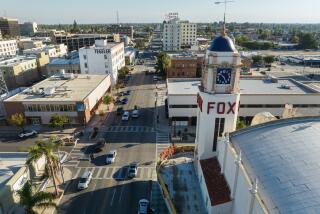L.A. Mayor Villaraigosa considers a carbon surcharge for DWP customers
Los Angeles Mayor Antonio Villaraigosa is moving ahead with a plan requiring customers of the Department of Water and Power to pay higher bills to help the utility tap more sources of renewable energy.
While Villaraigosa has been talking publicly about the need for the city to tighten its belt, his advisors have been working behind the scenes to gauge public support for a monthly DWP “carbon surcharge” of $2.50 -- one that would move the utility away from coal and toward wind, solar and geothermal sources of energy.
Unless the DWP secures the extra revenue, Villaraigosa will not meet his goal of having 20% of the utility’s electricity come from renewable sources by Dec. 31, said former Deputy Mayor Sean Clegg, a political consultant who worked on a voter survey dealing with the issue.
“Without a carbon surcharge . . . the DWP is going to start going backwards on the renewable portfolio,” he said.
Clegg said the mayor had not settled on the size of a proposed surcharge, which could be higher or lower than the $2.50 proposal included in a voter survey commissioned by the mayor. That poll, commissioned by Villaraigosa’s Committee for Government Excellence and Accountability, concluded that 64% of respondents would support a $2.50 surcharge.
The results were obtained, in part, to influence the city’s “opinion makers” -- including the City Council, which will probably vote on a new DWP surcharge in coming weeks.
During last year’s inaugural ceremony, Villaraigosa promised to end the DWP’s reliance on coal by 2020 and ensure that the agency’s renewable-energy portfolio reached 40% the same year.
Since then, the mayor and council members have spent much of their time on a plan to eliminate a $484-million budget shortfall, which could result in the layoffs of thousands of city employees.
Councilwoman Jan Perry said it would be “hard to explain” why the city is scaling back on services, including road repairs and libraries, while asking DWP customers to absorb more expensive bills.
“I think this is a tough time to ask people about any increase, unless you’ve made a very strong case to show that you have reduced operating costs as much as possible,” she said.
Villaraigosa aides have already met twice with Perry, who heads the council’s Energy and Environment Committee, to discuss the process for reviewing a new surcharge on DWP bills. During those conversations, the mayor and his aides have mentioned the poll.
“Even in this tough economic context, there is broad-based support from the Valley to the harbor for a modest carbon surcharge that will help wean this city off of coal,” Clegg said.
On Friday, a city-hired consulting firm released a report on the DWP’s existing surcharge, known as the Energy Cost Adjustment Factor.
That surcharge pays not just for the fluctuating cost of renewables, but also other energy sources, such as coal and natural gas.
PA Consulting recommended that the City Council immediately increase that surcharge eightfold, then begin the process of restructuring rates so that customers who use less power pay comparatively less.
One environmental advocacy group favored a “carbon tax” but doubted that the DWP was prepared to pursue Villaraigosa’s newest renewable-energy promise.
“We’re concerned that the right strategy is not in place, and won’t be in place, in time to achieve that goal in 10 years,” said Rhonda Mills, Southern California program director of the Clean Power Campaign. “There’s a bunch of stuff that has to start happening right now, and we don’t see that in the DWP’s planning.”
Polling data provided by Villaraigosa’s team said that 85% of respondents favored a reduction in electrical rates for those who use energy-saving appliances, while 84% backed tax incentives for companies that invest in clean energy technologies. In the same line of questions, only 52% favored a surcharge or fee to cover the cost of converting the DWP from coal to renewable sources.
In another part of the survey, however, 64% of respondents said they were willing to pay a $2.50 surcharge to move the DWP off of coal, pollsters said.
A $2.50 surcharge would get Villaraigosa only part of the way toward his 2020 renewable-energy goal, Clegg said.
“It wouldn’t make political or economic or policy sense to try to eat the whole apple in one bite,” he said.
david.zahniser @latimes.com
More to Read
Start your day right
Sign up for Essential California for news, features and recommendations from the L.A. Times and beyond in your inbox six days a week.
You may occasionally receive promotional content from the Los Angeles Times.







